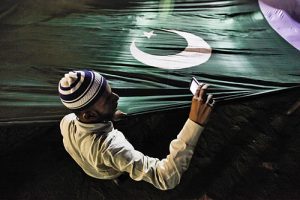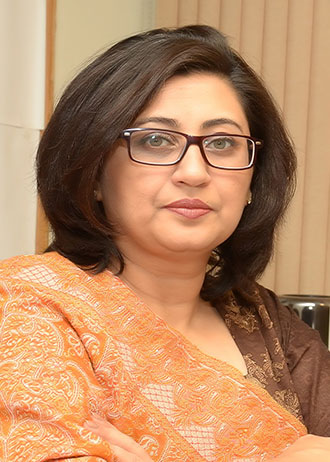
It seems like there’s nothing absolute in this world anymore, not even truth; for my truth may not be your truth, yet or ever. What does this specifically mean for journalism today? It means chaos. The disruption caused by social media has not only shattered the edifice of traditional journalism, it has also brought forth discrepancies that were, till a few years ago, considered an in-house matter. It will be a while before the dust settles and a new media order gains foothold, but till then no information is sacred and there are no holy cows.
There was a time before this chaos when private media in Pakistan was considered the most editorially independent in South Asia and the Middle East combined. Editors held sway over publishers and news directors had the last word. There is, of course, hardly any country in the world where the media is, or has ever been, completely one hundred per cent free. If not state censorship, there are non-state pressures, and obviously Pakistan is no different. Trained and experienced journalists are, however, equipped to manoeuvre their way around these pressures, and until a few years ago, they were allowed the freedom to use their judgment to quite an extent.
But the commercialisation of the media changed all that, raising the stakes so high that publishers today feel they can no longer afford to compromise their business interests by allowing unlimited editorial independence. This has led to one mishap after another, discrediting journalism and disbalancing the foundation that was painstakingly created over decades. And increasingly, there is also the realisation that while the media may not be lucrative on its own, backed by business it could be turned into a political powerhouse. Hence the fate of journalism has started to take a turn for the worse, so much so that the current onslaught on the media is nothing short of an open season on journalists and journalism.
While journalism and politics do make for interesting bedfellows, it’s not a match made in heaven. When media houses fall prey to their political biases, we see compromised journalism. The very reason audiences got fed up with PTV is almost exactly why people are switching off their TVs today. Strangely, in all this chaos, or perhaps because of it, the value of neutral and unbiased news has gone up substantially. People have started to crave actual news, instead of opinion forced to dress up as news.
Let’s break down the problem bit by bit. Journalism and activism have traditionally had separate roles. Pakistan’s euphoria with electronic journalism and the meteoric rise of social media has created an overlap, resulting in the sort of confusion we see today. The very essence of journalism is being forcibly redefined by those wearing both these hats simultaneously. Journalism is about remaining neutral and activism is about taking a side; forcing them to merge compromises the integrity of both. Those who justify this amalgamation say journalists can no longer remain silent observers in today’s highly charged environment. Experienced and well-trained journalists are able to navigate this chaos. But the sudden rise of social media continues to give birth to those that think they are journalists because they have access to a camera and the means to easily broadcast their work without any filters. Therein lies the problem. Social media influencers are not journalists, no matter how much they want to be, because they are not trained in the craft.
Journalism is like every other specialised profession. It takes years of hard work, dedication, desk work and field work as well as a regular reading habit to amass enough information and knowledge to qualify. A smart phone and an internet access are mere tools of the trade, they are not the qualification.
The current chaos and commercialisation have also facilitated the backdoor politicisation of journalism. As with every other pillar of the state, the media in Pakistan has become highly polarised. Editorial policies carry no weight today; they are almost always superseded by other interests or pressures. And actual journalists are expected to accept this change in the name of media solidarity, national interest or patriotism. The space for true journalism has been relegated to the corner.
The selection of guests in most talk shows is a clear reflection of the ongoing politicisation. One of the unique selling points of talk shows is the quality of guests. Viewers tune in to listen to experts and subject specialists, not be subjected to theatrics. But now the bar has been lowered to such an extent that the visible intellectual degradation has convinced audiences that they themselves might do a better job as guests. And so everyone has become an expert, an analyst, and even a journalist. This has changed the role of talk show hosts from that of referees to commentators. It’s become more lucrative to generate excitement than to encourage conclusions.
Competitiveness in the field of news has pushed channels into a race of ratings and revenue, dramatising and thus diluting the seriousness of news. That is ultimately affecting the credibility of the mainstream media. For entertainment people have a wider access to dramas, films and social media, like never before. It falls upon journalists to protect the sanctity and value of news. We have to take responsibility for this devolution from solemnity to shallowness.
The hallmark of a journalists’ careers used to be their recognition as specialists in their area of work, be it education, health, economics, sports, politics or the arts. That standard and expectation is no longer in vogue. Everyone these days, from a paanwala to a politician, believe they know more than others about everything under the sun. With so many traditional and digital channels out there, there is no dearth of platforms eager to air their opinions. When generalisation is favoured over specialisation, the media is bound to take a hit.
Digital media disruption has sanctified attempts to regulate or control (depending on which side of the fence you are on) all variety of media in Pakistan. Although a media code of ethics and conduct does exist, the present-day chaos has pushed it far aside. Even the implementation mechanism in the form of defamation laws is very much present, be it via establishments like PEMRA (Pakistan Electronic Media Regulatory Authority) or directly through the courts. But the cacophony of deafening noises is allowing the government to take a chance on tinkering with the existing laws on the pretext of controlling the chaos.
The thing to remember here is that while social media may be a cesspool of misinformation and propaganda, it does ultimately have all the information for those who are serious to seek it. Information censored on mainstream media invariably always makes its way onto social media. 2021 is an altogether different era. Truth and information can no longer be hidden, at least not for long. It will come out ultimately, so common sense says it should be allowed to come out professionally on mainstream media, otherwise that information will circulate as a rumour, keep getting more and more distorted, and ultimately become false news.
If the government is at all interested in regulating the media scene in Pakistan, it would be prudent to start with fixing the questionable TRP (Television Rating Point) system and making it more reflective of the country’s viewing choices. It would be foolish to erect structures based on faulty yardsticks. The tide is turning. TV screens are losing importance. Most urban audiences, especially the younger ones, no longer view mainstream media directly; they use social media links and posts as conduits to digital versions of traditional news outlets. That’s already started to play havoc with traditional TRP systems.
If only we could go back to the basics for a while, just till the dust settles. If only we could show the digital generation what real news is like and how neutrality can also be powerful. When computers were first introduced to media houses way back in the 1990s, most journalists had no idea what to do in case of a computer glitch. The standard IT advice those days would be for us to ‘reboot’ the system. It usually worked. Rebooting is an interesting concept, works very well in real life too. What should have evolved into even more responsible journalism is now turning into just noise. A reboot may not be such a bad idea after all.

The writer is a senior journalist.




Comments are closed.